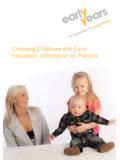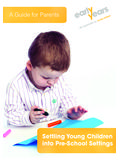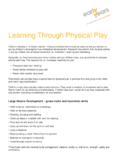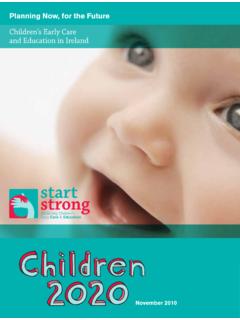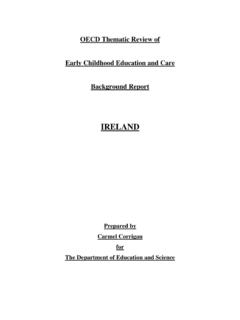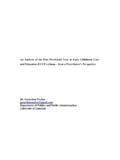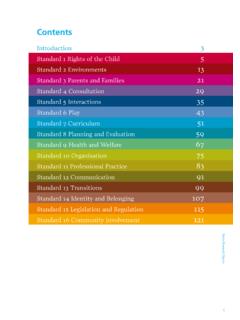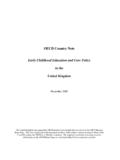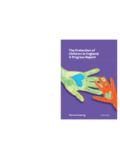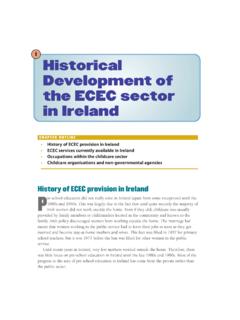Transcription of Childminding and Day Care for Children Under Age …
1 Childminding and Day care for Children Under Age 12 Minimum Standards IMPLEMENTATION GUIDANCE Version 2 July 2013 2 Implementation Guidance Foreword The publication of Minimum Standards for Childminding and Day care for Children Under 12 is a significant milestone in the history of the regulation of this important sector. The Children (NI) Order 1995 and its Regulations and Guidance have guided the Trusts in carrying out their statutory duties to register and inspect child care provision in Northern Ireland. I welcome the provision of a statement of minimum standards for Childminding and day care by DHSSPS which will ensure a consistent approach to registration and inspection across all Health and Social care Trust areas.
2 This guidance, provided by the Health and Social care Board and endorsed by the DHSSPS, provides the additional framework required to ensure a shared interpretation of the standards. As outlined in the Introduction to the Standards document, the Standards are minimum standards that must apply to services to be registered. It is our belief that all our services for Children want to provide more than minimum standards. Our Children (and their parents) should be able to access services of the highest quality. The process of Registration and Inspection should be regarded as a way of driving quality improvement to the highest level, with support for providers available from Child care Partnerships, Trusts and membership organisations.
3 I hope that you find this guidance useful in the application of the Standards to your situation and we encourage all, from providers to Registration and Inspection staff, to work together to provide the best quality of child care for our Children in Northern Ireland. Fionnuala McAndrew Director of Social care & Children Health and Social care Board Implementation Guidance 3 Introduction The introduction of Minimum Standards document by DHSSPS reflects the importance of having access to an up-to-date framework for the Registration and Inspection of Childminding and Day care services. The Children (NI) Order 1995 and its associated Guidance and Regulations reflected Standards which applied at that time.
4 The Minimum Standards document has sought to re-state the Standards in a current context. It also seeks to ensure that there is a consistency in their application across the five Health and Social care Trusts. The Minimum Standards will be subject to formal review by the Department. They are however subject to changes required to meet up-to-date advice on Safeguarding, Health and Safety etc. or evidence based quality developments. The Board s guidance may also need to be amended to ensure their currency in terms of advice and guidance. The Minimum Standards published in July 2012 apply to all new applicants for Registration with immediate effect.
5 Existing providers will be expected to comply with them by September 2013, or have agreed with the Registering Trust a time-frame for compliance and progress will be reviewed by Trust staff in the initial Inspections within this period. Adjustments to Registration requirements will be made through the process of Inspection and review of Registration during this period. The purpose of this Guidance document is to provide additional support in relation to the consistent implementation of the Minimum Standards through their translation into unambiguous requirements. This should ensure that Trusts registered child care providers and parents have clear expectations in relation to registered child care .
6 Reference to childminders in the document refers to those who provide child care in their own home. This refers to the household s daily living space that is used for the care of Children and includes relevant rooms sitting room, kitchen, bathroom(s), bedroom(s) and converted integral garage/extension (that is not developed solely for child care ). Attention is drawn to the change in these Minimum Standards to the ages of Children to be minded Compulsory School Age replaces the previously stated ( Under 5 years). This refers to Children who reach their fourth birthday before 1st July. 4 Implementation Guidance Reference to sessional day care in the Minimum Standards document includes schools providing breakfast clubs/out-of-school clubs (wrap around care ) where the main purpose is the provision of care and is additional to the statutory education provision (whatever the funding source) and is open for two or more hours in any day.
7 The guidance document recognises that the practices for different ages of Children will differ based on the purpose and function of a setting and this will be taken into consideration in the Inspection process. Facilities registered for sessional care during term time will remain as sessional care during school holidays and therefore will always be inspected in this way. Also, if a setting has more than one registration playgroup in the morning and out-of-school school club in the afternoon or two playgroups sessions in one day, then they need to close for a minimum period of 30 minutes between sessions in order to remain as sessional providers.
8 Each individual session will require an inspection unless the staff are the same. The minimum age a child can attend a playgroup is 2 years and 10 months and they can remain in this provision until they reach statutory school age. The maximum number of places for which a playgroup can be registered is 26. If an application is made for more than this maximum number, the request must be made to the Trust who in turn will seek approval from the Health and Social care Board to raise the maximum number. Only in exceptional circumstances will the request be granted to accommodate a sibling group. A cr che is a care facility for Children Under age 12 whose parents are occupied in some time limited activity ( education, leisure, conference, shopping etc).
9 Whilst the facility may be open for a full day, no child can attend for more than four hours. Cr ches will be registered Under Sessional Requirements. These requirements should be proportionate to the service provided but appropriate provision should be made for sleeping and changing/toileting. The maximum number of places for which a cr che may be registered is 26. The ratios of staff and space requirements for each age group must be taken into consideration at registration. It should be noted that occasional day care provision for less than 6 days per year is not required to be registered cr ches in a hotel to support conferences.
10 However, the Trust must be notified in advance of the intention to provide the service including the location, numbers and age-range of Children , numbers of staff and opening hours. Implementation Guidance 5 A Holiday Scheme provides care for school age Children during the school holidays. Children should be minded in groups of no more than 30. Trusts should seek appropriate advice and guidance from other key agencies with expertise in specific areas Environmental Health; Public Health Agency etc. When statutory requirements in these areas have to be met, confirmation of this should be sought from the relevant authority.
